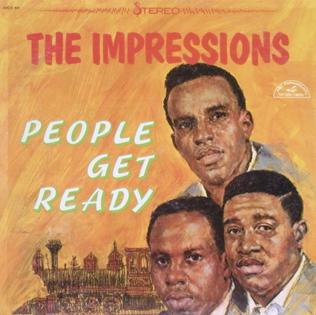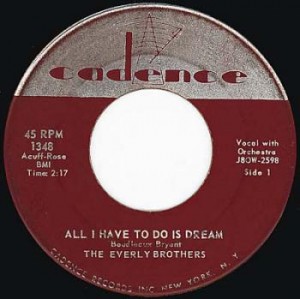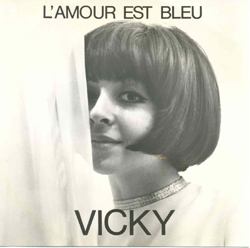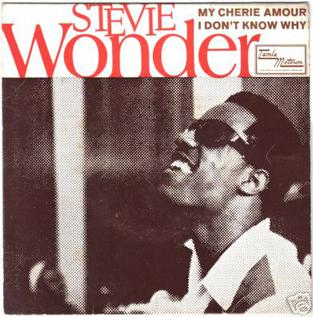
The Everly Brothers were an American rock duo, known for steel-string acoustic guitar playing and close harmony singing. Consisting of Isaac Donald "Don" Everly and Phillip "Phil" Everly, the duo combined elements of rock and roll, country, and pop, becoming pioneers of country rock.

"Gentle on My Mind" is a song that was written and originally recorded by John Hartford, and released on his second studio album, Earthwords & Music (1967). Hartford wrote the song after watching Doctor Zhivago in 1966, as he was inspired by the film and his own personal experiences. The lyrics describe the reminiscences of lost love of a man as he travels through the country. An obituary for Hartford indicated that the lyrics are "about a hobo reminiscing about a lost love". The following year, Hartford released the song as a single on RCA Records.

"You Keep Me Hangin' On" is a song written and composed by Holland–Dozier–Holland. It was first recorded in 1966 by American Motown group the Supremes, reaching number one on the Billboard Hot 100. American rock band Vanilla Fudge released a cover version in June the following year, which reached number six on the Billboard Hot 100. Wilson Pickett recorded it in 1969. English singer Kim Wilde covered "You Keep Me Hangin' On" in 1986, reaching number one on the Billboard Hot 100 in June 1987. In the first 32 years of the Billboard Hot 100 rock era, "You Keep Me Hangin' On" became one of the six songs to reach number one by two different musical acts. In 1996, American country singer Reba McEntire's version reached number two on the US Billboard Hot Dance Club Play chart. The BBC ranked the Supremes' original song at number 78 on The Top 100 Digital Motown Chart, which ranks Motown releases by their all-time UK downloads and streams.

"MacArthur Park" is a song written by American singer-songwriter Jimmy Webb that was recorded first by Irish actor and singer Richard Harris in 1968. Harris's version peaked at number two on the Billboard Hot 100 chart and number four on the UK Singles Chart. "MacArthur Park" was subsequently covered by numerous artists, including a 1970 Grammy-winning version by country music singer Waylon Jennings and a number one Billboard Hot 100 disco arrangement by Donna Summer in 1978. Webb won the 1969 Grammy Award for Best Arrangement Accompanying Vocalist(s) for the Richard Harris version.

"Achy Breaky Heart" is a song written in 1990 by Don Von Tress. First released in 1991 by the Marcy Brothers with the title "Don't Tell My Heart", it was later recorded by American singer and actor Billy Ray Cyrus and released on his debut album, Some Gave All (1992). The song is Cyrus's debut single and signature song. It became the first single ever to achieve triple platinum status in Australia and also 1992's best-selling single in the same country. In the United States, it became a crossover hit on pop and country radio, peaking at No. 4 on the Billboard Hot 100 and topping the Hot Country Songs chart, becoming the first country single to be certified platinum since "Islands in the Stream" by Kenny Rogers and Dolly Parton in 1983. The single topped in several countries, and after being featured on Top of the Pops in the United Kingdom, peaked at No. 3 on the UK Singles Chart. It was Cyrus's biggest hit single in the U.S. until he was featured on "Old Town Road" by rapper Lil Nas X, which peaked at No. 1 on the Billboard Hot 100 27 years later.

"I Wish It Would Rain" is a 1967 song recorded by the Temptations for the Motown label and produced by Norman Whitfield. The lyrics of this mournful song about a heartbroken man whose woman had just left him were penned by Motown staff writer Roger Penzabene. The lyricist had just learned that his wife was cheating on him and in his sorrow and pain, Penzabene penned both this and its follow-up "I Could Never Love Another ." Tragically the distraught Penzabene committed suicide barely a week after the single's release.

"People Get Ready" is a 1965 single by The Impressions, and the title track from the People Get Ready album. The single is the group's best-known hit, reaching number three on the Billboard R&B chart and number 14 on the Billboard Hot 100. The gospel-influenced track was a Curtis Mayfield composition that displayed the growing sense of social and political awareness in his writing.

"All I Have to Do Is Dream" is a song made famous by the Everly Brothers, written by Boudleaux Bryant of the husband-and-wife songwriting team Felice and Boudleaux Bryant, and published in 1958. The song is ranked No. 141 on the Rolling Stone magazine's list of The 500 Greatest Songs of All Time. The song is in AABA form.

"L'amour est bleu" is a song whose music was composed by André Popp, and whose lyrics were written by Pierre Cour, in 1967. Bryan Blackburn later wrote English-language lyrics for it. First performed in French by Greek singer Vicky Leandros as the Luxembourgish entry in the Eurovision Song Contest 1967, it has since been recorded by many other musicians, most notably French orchestra leader Paul Mauriat, whose familiar instrumental version became the first number-one hit by a French lead artist to top the Billboard Hot 100 in America.

"Piece of My Heart" is a romantic soul song written by Jerry Ragovoy and Bert Berns, originally recorded by Erma Franklin in 1967. Franklin's single peaked in December 1967 at number 10 on the Billboard Hot Rhythm & Blues Singles chart in the United States.

"My Cherie Amour" is a 1969 song by Motown singer-songwriter Stevie Wonder. The song reached number 4 on the Billboard pop chart in August to be Wonder's third top ten hit. The song was co-written by Wonder, Sylvia Moy, and Henry Cosby; Cosby also served as producer of the song. At the end of 1969, the song was ranked number 32 for the year.

"Let It Be Me" is a popular song originally published in French in 1955 as "Je t'appartiens" interpreted by Gilbert Bécaud. It became popular worldwide with an English version by the Everly Brothers and later with the duet by Betty Everett and Jerry Butler.
"Let's Get Together", also known as "Get Together" and "Everybody Get Together", is a song written in the mid-1960s by American singer-songwriter Chet Powers, from psychedelic rock band Quicksilver Messenger Service. A hit version by the Youngbloods, included on their 1967 debut album The Youngbloods, peaked at No. 5 on the Billboard Hot 100 in 1969.

"Cathy's Clown" is a popular song, written by Don Everly and recorded by The Everly Brothers in 1960. The lyrics describe a man who has been wronged and publicly humiliated by his lover: "Here he comes / That's Cathy's clown". The choruses are sung by brothers Don and Phil in their trademark close harmony style, while Don sings the bridges solo.
"By the Time I Get to Phoenix" is a song written by Jimmy Webb. Originally recorded by Johnny Rivers in 1965, it was reinterpreted by American country music singer Glen Campbell on his album of the same name. Released on Capitol Records in 1967, Campbell's version topped RPM's Canada Country Tracks, reached number two on Billboard's Hot Country Singles chart, and won two awards at the 10th Annual Grammys. Broadcast Music, Inc. (BMI) named it the third most performed song from 1940 to 1990. The song was ranked number 20 on BMI's Top 100 Songs of the Century. Frank Sinatra called it "the greatest torch song ever written." It was No. 450 on Rolling Stone magazine's Top 500 Songs of All Time.

The Everly Brothers Sing is an album by the Everly Brothers, released by Warner Bros. in 1967. It was re-released on CD by Collectors' Choice Music in 2005.
"Don't Forget" is a song by American singer Demi Lovato, from her debut album of the same name. It was written by Lovato and the Jonas Brothers, who co-produced the song with John Fields. It was released as the album's third and final single on March 17, 2009, through Hollywood Records. The inspiration of the song came from Lovato falling in love with someone who later left them. According to Lovato, it is one of the songs on the album that they most relates to. Musically, "Don't Forget" is a midtempo glam rock ballad that features Lovato singing with breathy falsetto vocals. An accompanying music video was released on March 20, 2009. In 2023, the song was re-recorded for her first remix album Revamped.

"Best I Ever Had" is a song by Canadian rapper Drake from his third mixtape So Far Gone. The song was later re-released on his debut EP of the same name. The song's popularity helped Drake decide to release So Far Gone as an EP, available for purchase. "Best I Ever Had" is also included as a bonus track on Drake's debut studio album Thank Me Later in certain countries.

"I Like It Like That" is a song written by Tony Pabon and Manny Rodriguez. It was initially a hit for boogaloo musician Pete Rodriguez in 1967, and was one of the most influential boogaloo songs of the era. Rodriguez released an album in 1967 with the same title.
"Lonely Street" is a 1956 song written by Carl Belew, Kenny Sowder, and W.S. Stevenson, originally performed by Belew, and later by Dave Rich.















